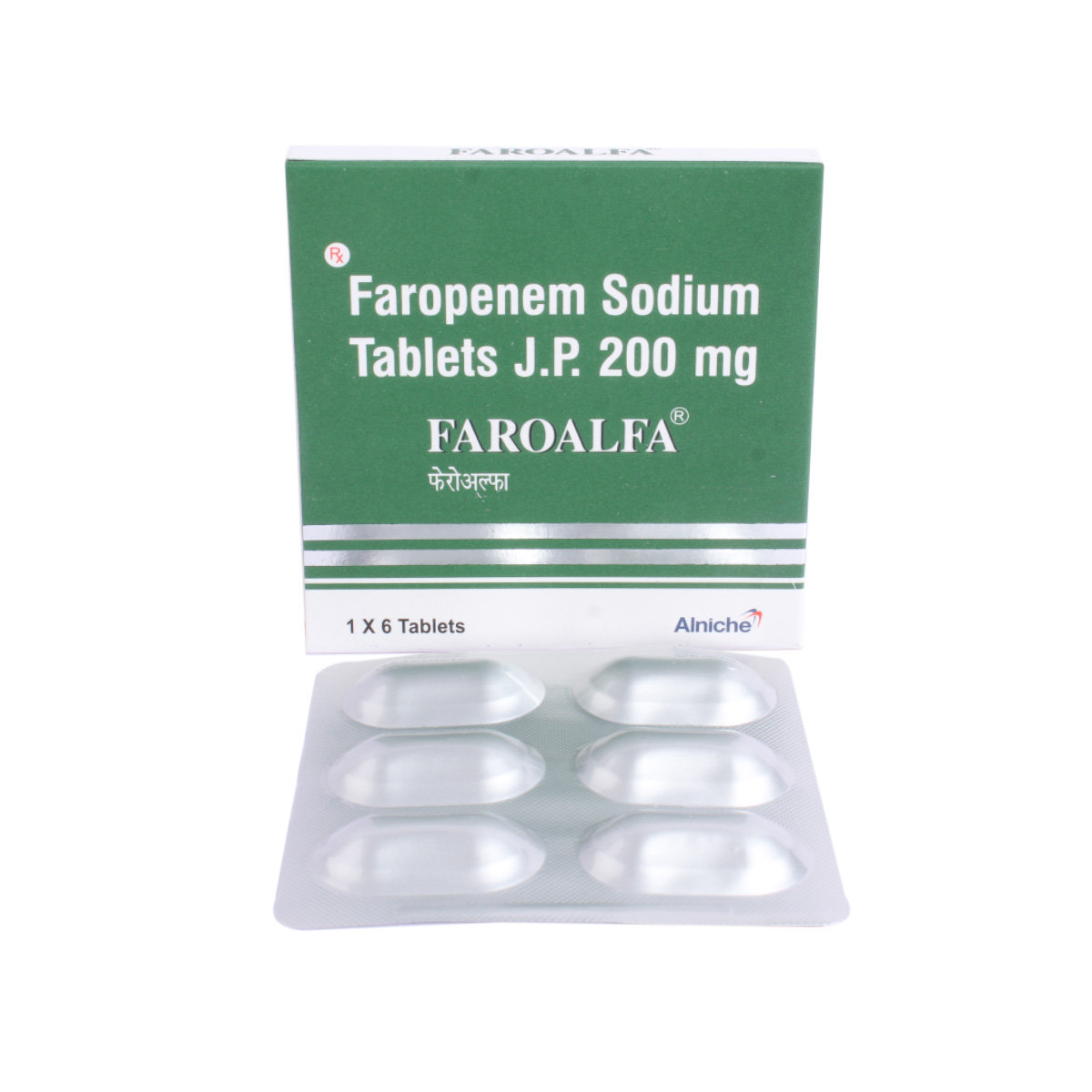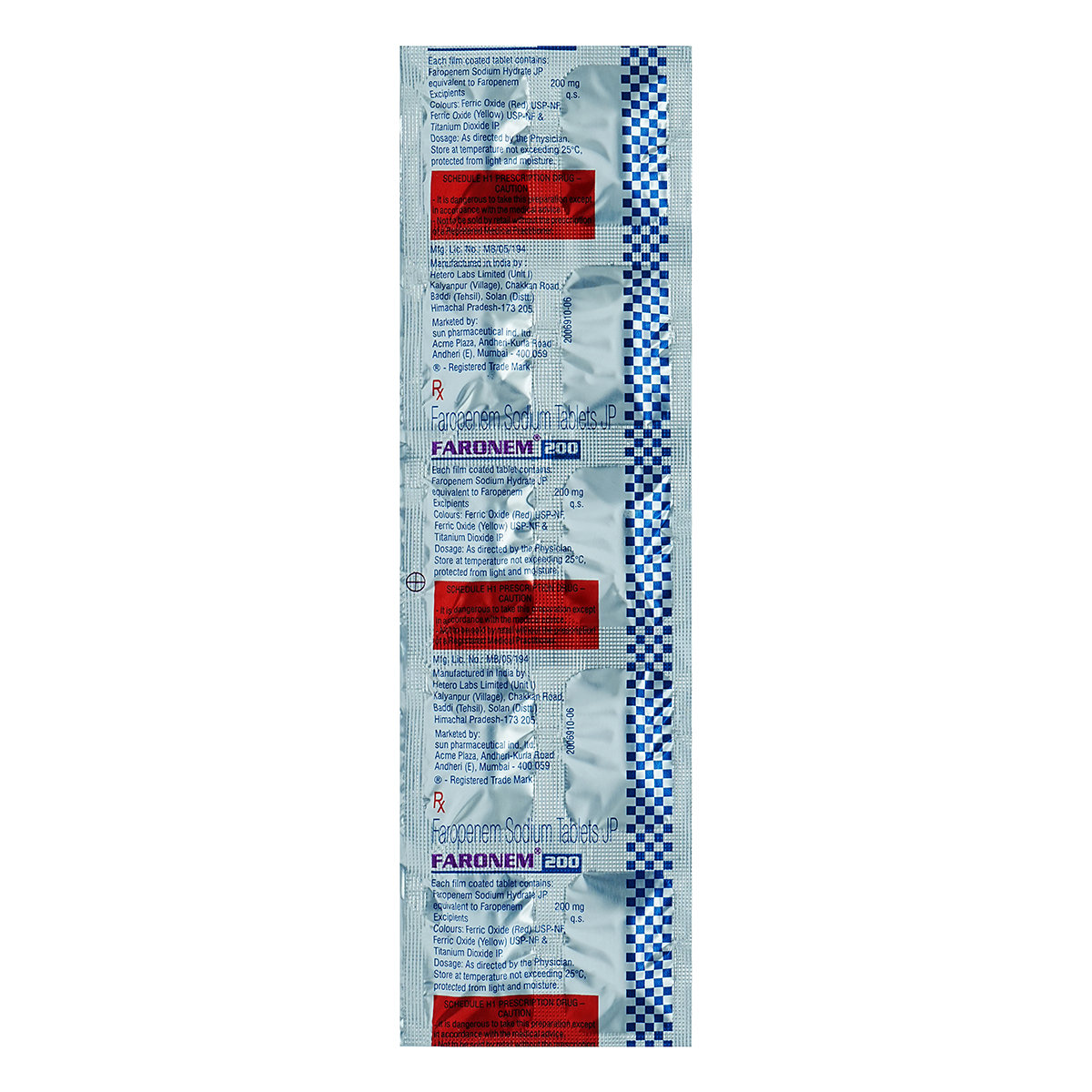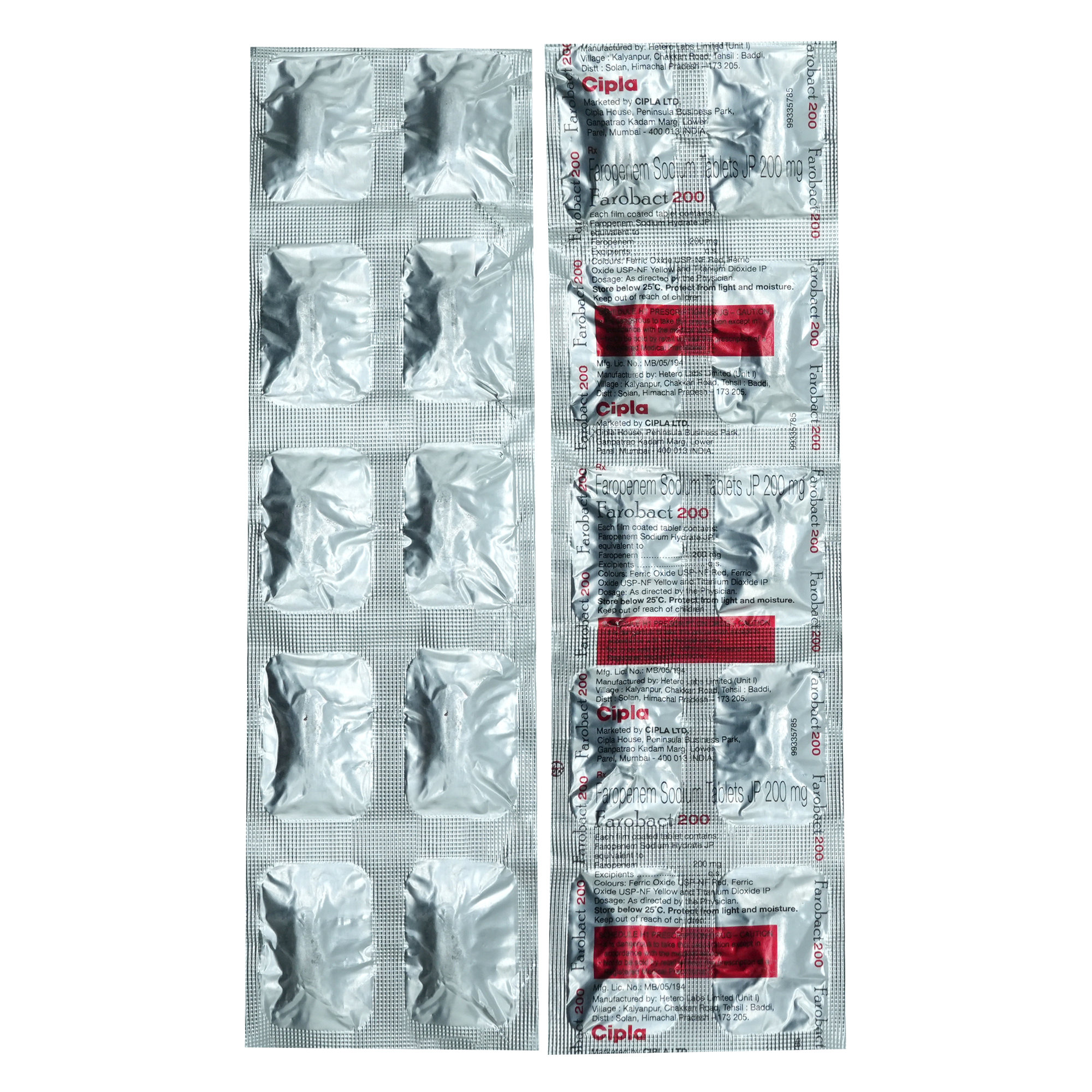Faroquaz-200 Tablet 6's
MRP ₹720.5
(Inclusive of all Taxes)
₹108.1 Cashback (15%)
Provide Delivery Location
Online payment accepted
 Prescription drug
Prescription drugWhats That
Composition :
Manufacturer/Marketer :
Consume Type :
Expires on or after :
Return Policy :
About Faroquaz-200 Tablet
Faroquaz-200 Tablet belongs to a class of drugs called beta-lactam antibiotics used in the treatment of several bacterial infections of the urinary tract, respiratory tract, skin, ears, nose, and gynecological infections. Bacterial infection is a condition in which harmful bacteria grow in the body and cause infection. It can infect any part of the body and multiply very quickly.
Faroquaz-200 Tablet contains Faropenem, an antibiotic that kills bacteria (bactericidal) by inhibiting the formation of the bacterial cell wall (a protective covering) that is necessary for their survival.
Take Faroquaz-200 Tablet as prescribed. Your doctor will advise you on how often you take your tablets based on your medical condition. In some cases, you may experience nausea, diarrhoea, stomach pain, and rash. Most of these side effects of Faroquaz-200 Tablet do not require medical attention and gradually resolve over time. However, if the side effects persist or worsen, please consult your doctor.
If you are known to be allergic to Faroquaz-200 Tablet or any other medicines, please tell your doctor. If you are pregnant or breastfeeding, please inform your doctor before taking Faroquaz-200 Tablet. If you have kidney problems, a family history of atopy (tendency to develop allergic reactions), glucose-galactose malabsorption, Lapp lactase deficiency, or galactose intolerance, inform your doctor before taking Faroquaz-200 Tablet. Faroquaz-200 Tablet may cause vitamin K or vitamin B deficiency in some patients, especially in older people and in patients with poor oral intake. However, consult your doctor if you notice symptoms such as bleeding easily, loss of appetite, swelling of the tongue, or stomatitis (swelling and sores in the mouth).
Uses of Faroquaz-200 Tablet
Directions for Use
Key Benefits
Faroquaz-200 Tablet is a broad-spectrum antibiotic that acts against both aerobic (grow in the presence of oxygen) and anaerobic (grow in the absence of oxygen) gram-negative and gram-positive bacteria. Faroquaz-200 Tablet is used in the treatment of several bacterial infections of the urinary tract, respiratory tract, skin, ears, nose, and gynecological infections. Faroquaz-200 Tablet inhibits the formation of the bacterial cell wall (a protective covering) that is necessary for their survival. Thereby, kills bacteria.
Storage
- Drink water or other clear fluids.
- To prevent worsening of pain, limit intake of tea, coffee, or alcohol.
- Include bland foods like rice, toast, crackers, and rice in your diet.
- Avoid lying down immediately after eating as it may cause indigestion or heartburn.
- Avoid acidic and spicy food as it may cause indigestion.
Drug Warnings
Regular monitoring of kidney and liver functioning is recommended while taking Faroquaz-200 Tablet. If you are a breastfeeding or pregnant woman, please consult a doctor before taking Faroquaz-200 Tablet. If you notice blood in stools or have severe stomach pain with diarrhoea, contact your doctor immediately. Faroquaz-200 Tablet may cause vitamin K or vitamin B deficiency in some patients especially in elderly people and in patients with poor oral intake. However, consult your doctor if you notice symptoms such as bleeding easily, loss of appetite, swelling of the tongue, or stomatitis (swelling and sores in the mouth). If you have kidney problems, family history of atopy (tendency to develop allergic reactions), glucose-galactose malabsorption, Lapp lactase deficiency, or galactose intolerance, inform your doctor before taking Faroquaz-200 Tablet.
Drug-Drug Interactions
Drug-Drug Interactions
Login/Sign Up
Drug-Food Interactions
Drug-Food Interactions
Login/Sign Up
Diet & Lifestyle Advise
- Take probiotics after completing the full course of Faroquaz-200 Tablet to restore some healthy bacteria in the intestines that may have been killed. Taking probiotics after antibiotic treatment can reduce the risk of antibiotic-associated diarrhoea. Certain fermented foods like cheese, yoghurt, kombucha, sauerkraut and kimchi can help to restore the good bacteria of intestine.
- Include fibre rich foods, as it can be easily digested by your gut bacteria, which helps stimulate their growth. Thus, fibre rich foods may help restore healthy gut bacteria after a course of antibiotics. Whole grains such as whole-grain bread, brown rice should be included in your diet.
- Make sure you drink plenty of water or other fluids every day while you are taking Faroquaz-200 Tablet.
Side Effects of Faroquaz-200 Tablet
- Nausea
- Diarrhoea
- Stomach pain
- Rash
Habit Forming
Therapeutic Class
All Substitutes & Brand Comparisons
RX
Not for online saleRenepenem 200 Tablet 6's
Rene Lifescience
₹474
(₹71.1 per unit)
34% CHEAPERRX
Not for online saleF Nem 200 Tablet 6's
Nutraferon Pvt Ltd
₹506
(₹74.22 per unit)
31% CHEAPERRX
Not for online saleMero-O 200 mg Tablet 6's
Aristo Pharmaceuticals Pvt Ltd
₹504.5
(₹75.68 per unit)
29% CHEAPER
Author Details
We provide you with authentic, trustworthy and relevant information
Drug-Diseases Interactions
Drug-Diseases Interactions
Login/Sign Up
FAQs
Yes, Faroquaz-200 Tablet may cause diarrhoea as a common side effect. However, if the condition persists, worsens with severe stomach pain or if you notice blood in stools, please consult a doctor.
Faroquaz-200 Tablet may be excreted in breast milk. Therefore, if you are a breastfeeding mother, please inform your doctor before taking Faroquaz-200 Tablet so that the doctor prescribes Faroquaz-200 Tablet only if benefits outweigh risks.
Yes, Faroquaz-200 Tablet may cause vitamin K and vitamin B deficiency in some patients, especially in older people and in patients with poor oral intake. It is not necessary for everyone taking Faroquaz-200 Tablet to experience this side effect. However, if you notice symptoms such as. However, if you notice symptoms such as bleeding easily, loss of appetite, swelling of the tongue or stomatitis (swelling and sores in the mouth), please consult your doctor.
No, you are not recommended to take Faroquaz-200 Tablet with furosemide as co-administration of these two medicines may increase the risk of kidney toxicity. However, please consult your doctor before taking Faroquaz-200 Tablet with other medicines.
No, you are not recommended to stop taking Faroquaz-200 Tablet without consulting your doctor as it may worsen the infection or cause recurring symptoms. Therefore, take Faroquaz-200 Tablet for as long as your doctor has prescribed it and if you experience any difficulty while taking Faroquaz-200 Tablet, please consult your doctor.
Drug-Drug Interactions Checker List
- FUROSEMIDE
- IMIPENEM+CILASTATIN
Special Advise
If you are suffering from rare hereditary problems of Lapp lactase deficiency, galactose intolerance or glucose-galactose malabsorption, avoid taking Faroquaz-200 Tablet as it contains lactose.
Disease/Condition Glossary
Bacterial infection: It is a condition in which harmful bacteria grow in the body and cause infection. It can target any part of the body and multiply very quickly. Bacteria come in three basic shapes namely spherical, rod, or spiral-shaped. Bacteria may be gram-positive (have thick cell walls) or gram-negative (do not have cell walls). Appropriate tests are done to identify bacterial strains and based on the results, proper medication is prescribed. Some common symptoms of bacterial infection include cough, fever, and tiredness.

Have a query?
Alcohol
Safe if prescribed
Interaction of alcohol with Faroquaz-200 Tablet is unknown. Please consult a doctor before consuming alcohol while using Faroquaz-200 Tablet.
Pregnancy
Consult your doctor
The safety of Faroquaz-200 Tablet in pregnant women is unknown. Therefore, it is given to pregnant women only if doctor thinks benefits outweigh risks.
Breast Feeding
Consult your doctor
Faroquaz-200 Tablet is excreted in human milk. Therefore, it is given to breastfeeding mothers only if doctor thinks benefits are greater than risks.
Driving
Safe if prescribed
The effect of Faroquaz-200 Tablet on driving is unknown. So, drive only if you are alert after taking Faroquaz-200 Tablet.
Liver
Consult your doctor
Take Faroquaz-200 Tablet with caution, especially if you have a history of Liver diseases/conditions. The dose may be adjusted by your doctor as required.
Kidney
Consult your doctor
Take Faroquaz-200 Tablet with caution, especially if you have a history of Kidney diseases/conditions. The dose may be adjusted by your doctor as required.
Children
Safe if prescribed
Faroquaz-200 Tablet is not recommended for children as the safety and effectiveness were not established.


















